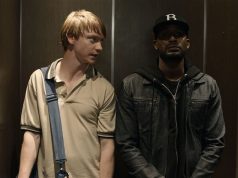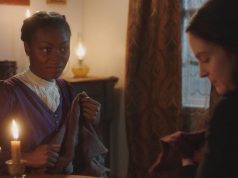One of the most admirable things about “Church Ball,” Mormon filmmaker Kurt Hale’s fourth slap-happy contribution, is that you don’t have to be Mormon to appreciate the premise. This is a switch from Hale’s previous films (“The Singles Ward,” “The R.M.” and “The Home Teachers”), which relied heavily on things so intrinsically Mormon that had any non-Mormons accidentally wandered into the theaters where the films were being shown, they’d have been completely baffled (not to mention curious as to how someone’s home movies came to be exhibited in a commercial cinema).
“Church Ball” is about church basketball leagues, and how the men get so competitive and violent that you start to forget it was devotion to God that brought them together in the first place. I don’t know if other faiths have basketball leagues, or if other religions build gymnasiums into all their meetinghouses the way Mormons do, but it doesn’t matter. Even if you have no experience with these things, you can easily accept that they exist and enjoy the upbeat tone and occasional chuckle that make “Church Ball” a mildly entertaining experience.
The characters in the film are Mormon — their ecclesiastical leader is called “bishop,” and a Book of Mormon verse is quoted at one point — but the word “Mormon” and its synonyms are noticeably absent from the dialogue. In fact, all of the language has been scrubbed clean of any overt references to The Church of Jesus Christ of Latter-day Saints, all the better to give the film mass-market appeal. For example, Mormon congregations are called wards (the equivalent to what Catholics call parishes). But here, the term “ward” has been replaced with the more generic, all-inclusive “congregation.”
Whatever we’re calling it, the Mud Lake team is a rag-tag group of lousy players who are defeated every year by the rock-solid team from Crystal Hills. This is the last year the church will have officially organized leagues, and Bishop Linderman (Fred Willard) — a church ball veteran with an eye patch and other injuries to prove it — wants to make it a good one. So he replaces Mud Lake’s doddering old coach with Dennis Buckstead (Andrew Wilson), a mediocre player who must now coach his uncoordinated teammates to victory.
Hale, working from a screenplay that he wrote with Paul Eagleston and Stephen Rose, leaves no sports-movie cliché unturned, right down to the last-second play that decides the game and a serious overuse of music-accompanied montages. (I counted four montages, which is probably three too many for a 90-minute comedy.) Dennis and his teammates recruit new players, endure practice drills, and suffer the kind of humiliations and setbacks you expect from an underdog team, and since it’s a sports comedy (rather than an inspiring sports drama), you can count on there being a grossly out-of-shape player and one from a foreign country, too.
For some reason, Gary Coleman shows up as a diminutive new neighbor who is recruited for the team. He has three very tall sons, though. Why can’t they play? The movie doesn’t tell us. I assume it’s because it’s funnier for Gary Coleman to play basketball than it is for three tall guys to do so.
But there are many legitimately funny moments, too, often thanks to the contributions of the brilliant Fred Willard as the jovial, semi-insane bishop. Curt Doussett and Larry Bagby are great as two of Crystal Hills’ arrogant players, a pair of lawyer brothers with a signature frat-boy laugh. And Ross Brockley has a wry, understated delivery as Mickey, a Mud Lake player with a potty mouth. His profanity is bleeped every time, which, as “Arrested Development” has taught us, only makes it funnier.
On a whole, the acting is a step up from previous Hale efforts, no doubt due to the company having hired mostly professional actors rather than the filmmakers’ buddies. (In fact, the two most obviously amateur contributors are the basketball referees, played by Hale regulars: Salt Lake radio tool Jimmy Chunga and over-the-top Utah comedian Michael Birkeland.) It’s a wonder what committed, experienced actors can do for a mediocre script.
Unfortunately, there’s a lot of the usual Hale time-wasting, too. There’s a running gag with Dennis’ daughter preparing themed dinners — apparently just an excuse to make the actors wear silly hats — that isn’t funny enough to justify its randomness. Two scenes involving Dennis’ day job are completely irrelevant, and so is the sequence where the Mud Lake team has to go door-to-door selling meat. And the subplot where a nerdy Mud Lake player finds love is as pointless as it is bizarre.
Did I laugh? Yes, several times. Even with the just-mentioned tangents it’s still a more cohesive, streamlined story than, say, “The Singles Ward,” and the production values are getting better each time.
HaleStorm, the production company that distributes Kurt Hale’s films (among others), has said it will shift its focus to mainstream family comedies instead of Mormon-specific ones, and “Church Ball” is an indication that the metamorphosis has already begun. Will the gambit pay off? Will non-Mormons start noticing HaleStorm’s productions? I wouldn’t bet the tithing money on it yet, but they’re heading in the right direction.
B- (1 hr., 31 min.; )





